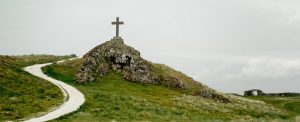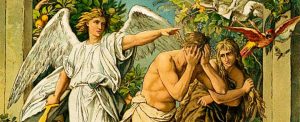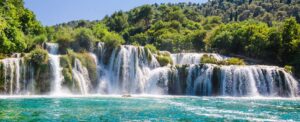Acts 16:16-34; John 9:1-38
Glory to God the Father, the Son, and the Holy Spirit.
In today’s Gospel, a blind man is made whole by his faith! …No, wait… That’s a different blind man.
This blind man is sitting with his begging cup, and out of nowhere a stranger puts mud on him and says “Go wash your face at Siloám.” No reason given. No promise. No expectation of a miracle.
The blind man is healed as he obeys.
“Now there is in Jerusalem by the Sheep Gate a pool, which is called in Hebrew, Bethesda, having five porches.” We saw this place two weeks ago when the Paralytic was healed there. Its name Bethesda means The House of Mercy.
Today the blind man is healed as he obeys. He goes to the waters at the House of Mercy, obeys the Lord’s simple command to wash his face — and he’s healed.
Sound familiar? Two weeks ago, in John 5, the paralytic was healed at the same place by Someone whose name he did not know – not through faith, and without any understanding. Rather like another paralytic, over in Luke 5, who was healed – not because of his faith, but Luke explicitly says the Lord saw the faith of those who brought him and lowered him through the roof (v.16-20).
It is no coincidence that in today’s Epistle reading from Acts 16, the jailer is told “Believe on the Lord Jesus Christ, and you and your household will be saved.” The jailer and all his family are baptized. Just as Jewish boys are circumcised on their eighth day, before they ever personally decide to embrace their Law, today the prison guard’s children are baptized into the Church because of their parents’ faith.
As with the blind man and both the paralytics, the grace of the Lord in baptism works, because it doesn’t depend on anybody’s mental capacity or conceptual formulations.
But what a waste it is to receive the water of new birth, to be established in Christ, but then to go on unhealed in our sins and passions. Here we are, in the House of Mercy, like the blind man, but we remain darkened.
“The lamp of the body is the eye. Therefore, when your eye is good, your whole body also is full of light” (Matt 6:22; Luke 11:34).
The King James version reads, “when thine eye is single.” That word aplous literally means clear, simple, single.
“But when your eye is bad, your whole body also is full of darkness. Therefore take heed that the light which is in you is not darkness.”
Man’s heart is the place where he is meant to walk with God in the light – but man’s heart is darkened by passions. Man’s attention is splintered by compulsions and delusions, distractions and obsessions. “If therefore the light that is in you is darkness, how great is that darkness!” … “A double-minded man [is] unstable in all his ways” (James 1:8).
In the Psalms, King David prays: “Unite my heart to fear thy name” (Psalms 86:11). When the eye of your soul becomes single, pure, clear and whole, you will be entirely full of light.
* * *
When we were baptized, we made a beginning. But in many places in scripture we are reminded that “he who perseveres to the end will be saved.” (Matthew 24:13; Mark 13:13; 1 Timothy 4:16; Hebrews 6:12; James 1:12). Between what we are now, and the likeness of God, lies the journey that the Fathers call purification, illumination, and union with God.
In John’s Gospel, the Lord says, “I am the light of the world. Whoever follows me will not walk in darkness, but will have the light of life” (8:12). But then he turns round and says, “You are the light of the world. A city that is set on a hill cannot be hidden. Nor do they light a lamp and put it under a basket, but on a lampstand, and it gives light to all who are in the house. Let your light so shine before men, that they may see your good works and glorify your Father in heaven” (Matt 5:14-16).
We receive light in order to shine and become light.
St Maximos the Confessor wrote about how a sword is forged. (in Opuscula 16 and in Ambiguum 7). The metal does not cease to be iron. But as it is worked in the fire of the forge, it begins to participate in the properties of the fire so that it likewise emits light and heat. The metal of the sword participates in the nature of the fire. The red-hot iron sword begins to emit light and heat. Metal doesn’t change its nature but it partakes of the action of fire.
In the same way, when Christ the Word of God became human, he united the human and divine natures in his one Person. Like a sword in a fiery forge, the nature of Adam is joined to the eternal nature of God the Word – and in union with Christ, we who are in Christ may likewise start to participate in his divine nature, righteousness and holiness and life. We do not become God by nature, but we become what God is through the action of grace. So Saint Peter writes that God has called us to glory and virtue and committed himself that “you might be partakers of the divine nature.” (2 Peter 1:4)
The Gospel is not about becoming better people. Man is not made merely to be pardoned from sins. Man is made for union with the living God. For participation in the life and nature of God.
What does that look like?
“I am the true vine, and my Father is the gardener. He cuts off every branch in me that bears no fruit, while every branch that does bear fruit he prunes so that it will be even more fruitful. Remain in me, as I also remain in you. No branch can bear fruit by itself; it must remain in the vine. Neither can you bear fruit unless you remain in me. In this my Father is glorified: that you bear much fruit, showing yourselves to be my disciples (John 15:1-8)
The Father is glorified when we bear much fruit. What is the fruit of the Holy Spirit? If you grew up in church, you probably learned from Galatians 5, “The fruit of the Spirit is love, joy, peace, forbearance, kindness, goodness, faithfulness, gentleness and self-control. Against such things there is no law.” (Galatians 5:22-23)
Some people prepare for confession by reading the Ten Commandments and asking, “Have I stolen? Have I murdered?” But I recommend you read Galatians 5 and ask yourself if the fruit you produce is love, joy, peace, patience…
We read in 1 Corinthians that “Love is patient and kind; love does not envy… does not seek its own, is not provoked, thinks no evil… Love never fails” (1 Cor 13:4-7). Put your name in there: When you say about yourself, “Silouan is patient and kind, Silouan does not seek his own benefit,” is it true? If not, then you may have something to work on, and that repentance is what you’d bring to confession.
For all these weeks since Pascha we have been eating and drinking, rejoicing in the resurrection. But today is the last Sunday when we’ll say, “Christ is risen.” This Thursday is the Ascension of Christ. It’s a bittersweet day, in that Christ is glorified – but the Church is left alone.
After Ascension, for ten days, in the place in our prayers where we have been saying “Christ is risen” and where we will start saying “O Heavenly King” after Pentecost – after Ascension there will be an empty spot.
We have rejoiced with the Bridegroom, but now begin the days when we need to remember, “Blessed are those who hunger and thirst for righteousness – for they shall be filled” (Matthew 5:6).
Like the Samaritan woman we need to recognize our thirst. We need to remember our blindness. Our hunger, thirst, and need for God can look like irritability, short temper, coldness toward the ones we love. It can looks like dissatisfaction, increase in temptation, an aversion to prayer. Those are ways our soul lets us know we are darkened and thirsty, and nothing but the grace of God will satisfy us, make us whole, unite us to Christ.
In two more weeks Pentecost will come, whether we are ready for it or not. So the Lord commands Isaiah to preach:
“Prepare ye the way of the Lord, make straight in the desert a highway for our God. Every valley shall be raised, and every mountain and hill brought low. The crooked shall be made straight, and the rough places smooth — And the glory of the Lord shall be revealed” (Isaiah 40:3-5).
In the prophecy of Jeremiah and again in Hosea we are called to “Break up your fallow ground” (Jeremiah 4:3-4; Hosea 10:12-13). Take your hard, untilled, unwatered, unproductive farmland and plow it, work that land, and prepare it to receive seed and produce fruit — “for it is time to seek the Lord, till He comes and rains righteousness on you.”
Between today and the coming of the Holy Spirit at Pentecost, let’s prepare the way of the Lord. The Wednesday and Friday fast days right now are all fish and wine and oil days anyway, so that’s not too hard. If, amid the riches of Pascha, we’ve lost the habit of fasting, then now is the time to return to where we started. Remember Christianity 101: pray, fast, give alms, forgive everyone, guard your eyes and your lips; love the Lord your God with all your heart and love your neighbor.
Your daily prayer rule, even if it is just a few minutes that you consistently stand before the Lord every day, puts the plow to the hard soil of your heart, it begins the work of clearing the clouds that darken the eye of your soul, and it takes one more step further up and further in to the high call of God in Christ.
Is your daily prayer a small and unimpressive obedience? Today in the Gospel, the blind man had only one obedience: Go wash your face at Siloam. Even if your daily prayer and discipline are small things, the Holy Spirit of God delights to empower your obedience and respond with grace. “He who is faithful in what is least is faithful also in much… The eyes of the Lord go to and fro throughout the whole earth, to show himself strong on behalf of the one whose heart is loyal to him.” (Luke 16:10; 2 Chronicles 16:9)
Abba Lot went to Abba Joseph and said to him, “Abba, as far as I can I say my little prayer rule, I fast a little, I pray and meditate, I live in peace as far as I can, I purify my thoughts. What else can I do?” Then the elder stood up and stretched his hands toward heaven. His fingers became like ten lamps of fire and he said to him, “If you will, you can become all flame.” (Sayings of the Desert Fathers)
I want to leave you today with a spirit of expectation.
There is a kind of hope that is really just a wish: I sure hope the bus will come soon. I hope the baby inherits her looks from her mama, not from her dad! But then there is confident expectation: Have you ever worked the midnight shift? By 3:00 on the morning you are barely even awake, but every graveyard shift worker knows the sun is coming. This is not a question. Darkness will come to an end. “Weeping may endure for a night but joy comes in the morning” (Psalm 30:5). This is real hope, and it does not disappoint (Romans 5:5).
In these days, before the outpouring of the Holy Spirit on the Church at Pentecost, stay thirsty. Stay faithful in small things. Isaiah says,
Come, all you who are thirsty, come to the waters; and you who have no money, come, buy and eat! Come buy wine and milk without money and without cost… For I will pour water on him that is thirsty, and floods on the dry ground: I will pour my spirit on your seed, and my blessing on your offspring (Isaiah 55:1; 44:3).
And it shall come to pass in that day, that the mountains shall drop down new wine, and the hills shall flow with milk, and all the rivers of Judah shall flow with waters, and a fountain shall come forth of the house of the Lord, and shall water the valleys (Joel 3:18)
And he showed me a pure river of water of life, clear as crystal, proceeding from the throne of God and of the Lamb” (Rev.22:1). And again: “And the Spirit and the bride say ‘Come,’ and let him who hears say ‘Come’. And let him who thirsts come. Whoever desires, let him take the water of life freely (Rev.22:17).
Blessed are those who hunger and thirst for righteousness, For they shall be filled (Matthew 5:6).
To the glory of God the Father, the Son, and the Holy Spirit.






